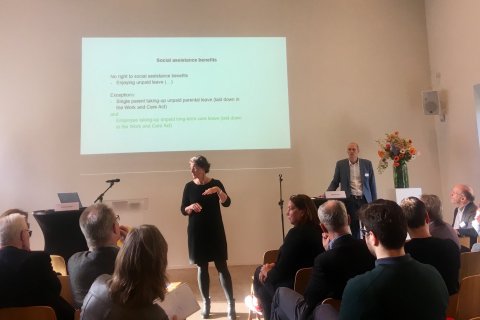Report Future of Work conference 18 October 2019

On Friday, 18 October 2019, the Future of work group of the Faculty of Law, Economics and Governance held a conference dedicated to the very topic ‘Future of Work’. The project started three years ago as one of the focus projects of the faculty and has now merged with the Hub Future of Work of the Institutions for Open Societies (IOS) in which several researchers explore the impact of societal challenges ranging from technological innovation, financial crisis, globalization, individualization, migration to health issues. The conference was organised to enable Utrecht University scholars to share their understanding of what the future of work might entail for different groups of workers, organisations, legal systems, labour markets and society as a whole. Held in the Garden Lounge at Centraal Museum Utrecht, the conference was attended by 45 persons and eight presentations were held.
Presentations
The first part was chaired by Labour Law professor Frans Pennings and focused on the topic of flexible work. Patrizia Zanoni, professor at the Department of Governance and Organization elaborated on the phenomenon of ‘sharing economy’ (or platform economy) and its regulation in Belgium. A very low taxation and the exemption of social security contributions are currently Belgian instruments to promote platforms. However, many platforms do not pay minimum wage, and do not provide secure work. Platform work may therefore pose an immense burden on the welfare state and its underlying negotiated system of solidarity.
PhD student Merel Keijzer (Labour Law) addressed the question of pay in untypical work relationships, such as a tripartite situation of employer, employee and a second company that the employee is outsourced to. Problems arise as to the pay of minimum wage, and the accountability for the employee; those problems become even larger in long chains of outsourcing.
Silvia Rossetti, who has been one of the postdocs of the Future of Work project, examined solo self-employment and the conditions under which it can become precarious work. She found that the lack of social security on the one hand leads to dependent solo self-employment but that on the other hand solutions are found to protect these workers from income security when social risks occur.
Prof. Joop Schippers, now one of the coordinators of the Future of Work hub, presented a paper that examines and compares work satisfaction of employees and self-employed persons in the EU. Self-employed reported a slightly higher work satisfaction than employees, but the factors that determine work satisfaction are the same for both groups and relate mainly to the work content and ‘rewards’ from works, like earnings.
After the coffee break Maarten Goos, the coordinator of the Future of Work project and professor of economics, chaired the second session. His colleague professor of economics, Wolter Hassink, elaborated on the relationship between gender and job search for temporary staff and payrolling jobs. From a large examination of data it can be concluded that temporary agency workers have lower wages and commute less far than payrolling workers. Also, females have lower commuting distances than males in general, especially for jobs searched individually.
Xianjia Ye, who also worked as a post doc in the Future of Work project, presented a paper that examines global value chains and the implications for developing countries. In global value chains it is getting harder and harder for developing countries to participate, especially in chains for technological products.
PhD candidate of Organization and Governance Evelien van Leeuwen presented a study that researched the careers of professionals (physicians) and the applicability of career theories. Existing career theories detect flexibility, short-term employment, and a high degree of job mobility as characteristics of present careers of professionals. Due to the high degree of specialization they only partly apply to the careers of physicians. For these workers, flexibility rather means flexibility to do different tasks within a job than moving to other jobs.
The last speaker, Susanne Heeger, also one of the Future of Work post docs, elaborated on the compatibility of work and care, focusing on long-term care. In the Netherlands, long-term care leave is unpaid, which is especially problematic for employees with a lower income. They fall below the subsistence level if they take up long-term care leave, and social security does not fill this gap. Therefore, she proposes to change social security laws by including protection for long-term caregivers in need of financial support.
The conference ended in the early evening with, in a good Dutch tradition, a 'borrel'.
The participants were invited to a discussion following each presentation. A vivid exchange of ideas and information made this conference a success.
In February 2020 a large conference on Future of Work will be held that will be aimed at an international audience.

